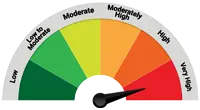Keeping in mind the nature of the stock market, the Nifty 50 has gone through several fluctuations since its inception in 1996. Nifty index funds are an avenue to invest in the Nifty 50. By investing in these funds, you can participate in the broader market and try to benefit from the potential of equities to generate wealth over the long run. If you are interested in investing in these index funds, read on to learn everything about them to make an informed decision.
What Is a Nifty Index Fund ?
It is a Nifty 50 mutual fund scheme which invests in the underlying stocks of companies of the Nifty 50 index and tracks it. Also called the Nifty 50 index fund, it tries to deliver returns similar to those of the Nifty 50 through passive investments. The fund manager tracks the index and changes the fund's portfolio according to the index constitution. Since a passive investment strategy is followed for this index fund, the total expense ratio for managing is lower than that of an active mutual fund. Therefore, the Nifty index fund is a low-cost investment option. This can help you earn returns in tune with those of the portfolio's underlying benchmark index. It is important to note that a Nifty 50 index fund differs from a Nifty ETF. While you can buy and sell an index fund at a price set at the trading day's end, you can trade an ETF fund throughout the day like stocks.
Investing in a Nifty Index Fund ?
You can invest in a Nifty 50 index mutual fund in the same as that in any other mutual fund scheme. You may hold the units of the fund in both your investment portfolio and Demat form. The fund house executes the transactions associated with investments and redemption at the prevailing net asset value (NAV).
Things to Consider Before Investing in Nifty Index Funds
Here are some important things to keep in mind before you invest in a Nifty index fund:

Performance of the fund
Since the fund might lose its value when market prices go down, you should have a combination of index funds and actively managed mutual funds.

Investment cost
Generally, the expense ratio of a Nifty 50 index fund is lower than that of actively managed schemes. That is because it is managed passively, i.e., the fund manager needs not make any active investment decisions.

Return on investment
It is a good idea to go for an index fund if you wish to invest over the long term. That is because these funds need more time to deliver returns than other kinds of funds.
Taxation for Nifty Index Mutual Funds
At least 95% of the Nifty 50 mutual fund's net assets are invested in the index's constituents. This fund is therefore considered an equity-oriented fund for tax purposes. Accordingly, it is taxed like an equity mutual fund.
Benefits of Investing Via Multi-Asset Funds?
Here are the advantages of investing in a Nifty index fund:

Low investment amount
As an index mutual fund accept money from multiple investors, an AMC allows you to invest a small amount in it. You can...
As an index mutual fund accept money from multiple investors, an AMC allows you to invest a small amount in it. You can begin to invest with as little as ₹500 per month via a systematic investment plan (SIP) and can partly own all the stocks of the Nifty 50. The proportion would be the same as that of the index.

Flexible investments
When you invest in a Nifty 50 index mutual fund via SIP, you can reduce or increase the investment amount whenever, and...
When you invest in a Nifty 50 index mutual fund via SIP, you can reduce or increase the investment amount whenever, and by any percentage you wish. That way, the process of investing in these funds becomes very simple and convenient.

Low-cost investments
A Nifty index fund replicates the index, Nifty 50. So, no researchers or analysts are required to help the fund manager in decision-making, for instance, which stocks...
A Nifty index fund replicates the index, Nifty 50. So, no researchers or analysts are required to help the fund manager in decision-making, for instance, which stocks to purchase, when to purchase, when to sell and so on. Besides, there is no active trading of stocks. As a result, the cost of managing these funds is low. This means that as an investor, you need to pay low fees when investing in these funds.

No worries about rebalancing
Your investment in a Nifty 50 mutual fund is managed by a fund manager. As a result, it is maintained in the same proportion as...
Your investment in a Nifty 50 mutual fund is managed by a fund manager. As a result, it is maintained in the same proportion as the Nifty index. The fund manager increase or reduces the weightage of a stock as per index. Therefore, you need not worry about maintaining or rebalancing the stocks in the same proportion as the index.

Unbiased investments
The fund manager has a defined mandate regarding how many and which stocks to purchase as per the index. So, there are...
The fund manager has a defined mandate regarding how many and which stocks to purchase as per the index. So, there are no chances of having a human bias in decision-making, and the index fund can be a great addition to your investment portfolio.
Best Index Funds in QAMC
Quantum Mutual Fund offers several mutual fund schemes in India that invest in equities, Gold, bonds, multiple asset. The company allows investors to start an SIP in any of its schemes with an amount as low as ₹500, besides offering an option to hold the units in the Demat mode.

Quantum Nifty ETF Fund of Fund
An Open-ended fund of fund investing in units of Quantum Nifty 50 ETF.
Quantum Nifty 50 ETF
An Open Ended Scheme Replicating / Tracking Nifty 50 Index.
Why Should You Invest in Nifty Index Funds Instead of Investing Directly in the Nifty 50 Stocks?
If you invest directly in the stocks of the Nifty 50 based on their weightage in the index, it would be a complicated, hectic and expensive exercise. The money needed to replicate the index is indeed one of the main challenges of investing directly in stocks. You can't purchase a portion of the stocks in India. In other words, you must buy a whole stock if you invest directly in it. That way, you would have to spend money to purchase all 50 stocks of the index. Here is an example to understand these challenges. Say, you wish to invest ₹20,000 per month in Nifty 50. You find out that one stock of Bajaj Finance costs more than ₹6,000 while that of Nestle costs over ₹17,500. In that case, by purchasing just 1 stock of each of these 2 companies only, your monthly limit of investment would be crossed. Now think about how much money you will need to purchase all the stocks that Nifty 50 is comprised of. Moreover, remember that you will even need to purchase all the stocks based on their real weightage in the Nifty 50 and keep up with the daily changes in the same. This is a highly time-taking task. Since the weightage of the stocks differs as their value increases or decreases, you will have to reflect the changes daily in your investment portfolio to replicate the index. An easy way to do away with all these drawbacks is to invest in a Nifty 50 index mutual fund.
Product Labelling
| Name of the Scheme | This product is suitable for Investors who are seeking* | Risk-o-meter of Scheme |
|---|---|---|
|
Quantum Nifty 50 ETF An Open Ended Scheme Replicating / Tracking Nifty 50 Index. |
• Long term capital appreciation • Investments in equity and equity related securities companies in Nifty 50 Index |

Investors understand that their principal will be at Very High Risk. |
|
Quantum Nifty ETF Fund of Fund An Open-ended fund of fund investing in units of Quantum Nifty 50 ETF. |
• Long term capital appreciation and current income • Investments in units of Qauntum Nifty 50 ETF - Exchange Traded Fund |

Investors understand that their principal will be at Very High Risk. |
*Investors should consult their financial advisers if in doubt about whether the product is suitable for them.
Disclaimer: The views expressed here in this Article / Video are for general information and reading purpose only and do not constitute any guidelines and recommendations on any course of action to be followed by the reader. Quantum AMC / Quantum Mutual Fund is not guaranteeing / offering / communicating any indicative yield on investments made in the scheme(s). The views are not meant to serve as a professional guide / investment advice / intended to be an offer or solicitation for the purchase or sale of any financial product or instrument or mutual fund units for the reader. The Article / Video has been prepared on the basis of publicly available information, internally developed data and other sources believed to be reliable. Whilst no action has been solicited based upon the information provided herein, due care has been taken to ensure that the facts are accurate and views given are fair and reasonable as on date. Readers of the Article / Video should rely on information/data arising out of their own investigations and advised to seek independent professional advice and arrive at an informed decision before making any investments. None of the Quantum Advisors, Quantum AMC, Quantum Trustee or Quantum Mutual Fund, their Affiliates or Representative shall be liable for any direct, indirect, special, incidental, consequential, punitive or exemplary losses or damages including lost profits arising in any way on account of any action taken basis the data / information / views provided in the Article / video.
Mutual fund investments are subject to market risks read all scheme related documents carefully.


